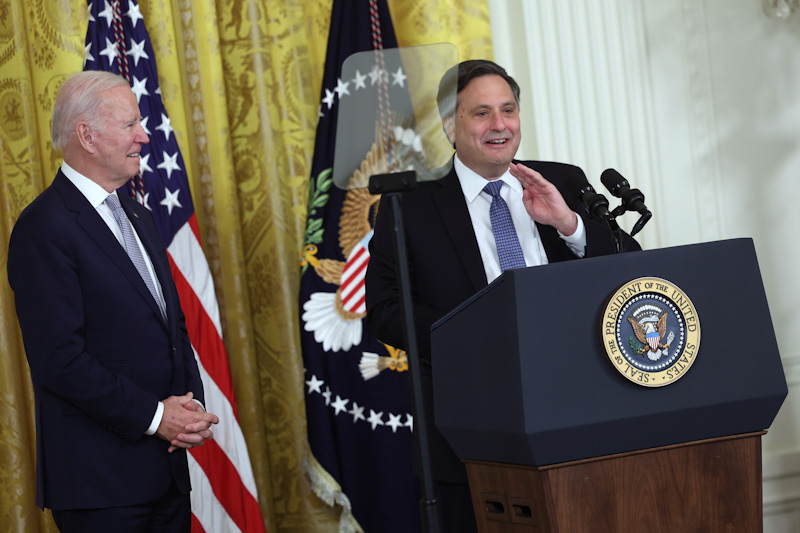Former Biden Chief of Staff Ron Klain reflects on life in law and politics

Outgoing Chief of Staff Ron Klain delivers remarks alongside President Joe Biden during an event to welcome his new chief of staff, Jeffrey Zients, in the East Room of the White House on Feb. 1 in Washington, D.C. Photo by Kevin Dietsch/Getty Images.
“The president’s time is the most precious resource we have at the White House,” Ron Klain tells me. As President Joe Biden’s chief of staff, it fell to Klain to make certain that it was used wisely.
With the exception of a team of senior advisers who were permitted direct access, “if you wanted to see the president,” Klain says, “my job was to say no. If you needed to see the president, my job was to make sure it happened.”
In April, after two years serving in the role that included Oval Office gatekeeper, Klain left the White House, returning to O’Melveny & Myers as a partner and head of its Strategic Counseling and Crisis Management Practice. He served as a partner at the firm from 1999 to 2004.
During a Zoom interview from O’Melveny’s New York City office—he’ll be based in its Washington, D.C., location—Klain discussed advising the president and Supreme Court nominees, as well as a very difficult call made to a near-president. He also shared his plans for his O’Melveny homecoming.
Lawyer to lawyer
The chief of staff is a critical confidant to the president and responsible for seeing that the administration’s agenda is carried out. Klain points out that the man he was counseling in the West Wing was himself a lawyer. “I think [President Biden’s] legal training and legal thinking [was] very present in decision-making,” he says.
But the pair brought different approaches. As president, he has a “broader palette” than “just a legal scope,” Klain explains. “He’s thinking about what’s in the best interest of the American people; thinking about policy matters.”
Klain complemented the president in the mold of a more traditional lawyer: “I’m analytical,” he tells me. “I try to think very rigorously about problems, the pros and cons, the facts, what the law is, how it applies in the situation.”
But the situations he confronted were anything but conventional. For many lawyers, making decisions comes after gathering information—a sometimes lengthy process. The nature of Klain’s job didn’t always allow for drawn-out fact-finding.
“I think a good lawyer should be ready to make a decision on whatever information they have … and when they need to make the decision.” While the decision may change as more information becomes available, Klain explains, “the point of being a good lawyer is being able to provide sound advice in the moment when it’s needed [and] not when you’re ready to give it. That’s really critical.”
Inspired by a Kennedy
Klain, 61, grew up in Indiana. His interest in politics came through a chance encounter at an early age. In 1968, Sen. Robert F. Kennedy, running for president, sought to film a TV commercial for the Hoosier state’s primary. An advance person found Klain’s father’s plumbing supply store in Indianapolis.
“They filmed one of Bobby Kennedy’s last TV ads at my father’s small business,” Klain recounts. “I got to meet Senator Kennedy that day and was really inspired and inspired by his famous speech in Indianapolis when Martin Luther King died. It just struck me as a very noble calling and filled with people who wanted to do the right thing.”
Klain headed to Georgetown University and then Harvard Law School. But he spent his third year back in nation’s capital. His fiancé, now wife, was in the Army and assigned to the Pentagon. This qualified Klain for a program that allowed him to complete his studies at Georgetown Law Center—and graduate from Harvard. He went at night and worked for then-Sen. Joe Biden in his Judiciary Committee office during the day.
Knowing how to say no
A common refrain is that to be a successful chief of staff requires being able to say “no” to the president. The adviser must be able to walk into the Oval Office and deliver bad news to the person behind the desk.
“Look, it goes with the job,” Klain says. But, in his case, it was different because of his decades-long relationship with Biden—including serving as his chief of staff while Biden was President Barack Obama’s vice president.
“I’ve known the president for 36 years, so he and I have a good relationship, and I can always speak plainly to him, and he always speaks plainly to me. So I don’t think it was so much the question [of saying] ‘no’ to the president, as it was to go in there and say, ‘Hey, this strategy we’re working on won’t work; we have to go do something else to get done what you want to get done.’”
Delivering bad news doesn’t only go with the job of the president’s chief of staff. He had been Vice President Al Gore’s chief of staff and then general counsel for Gore’s committee that oversaw the recount of the Florida vote in the 2000 presidential election.
On Dec. 12, 2000, the Supreme Court issued its decision in Bush v. Gore. The Florida recount was over. George W. Bush would be the 43rd president.
The court faxed a copy of the opinion to the committee’s Tallahassee office. Because of the decision’s lengthy introduction, it was not immediately apparent who won.
“To figure out what the court actually decided, [you needed] to read the opinion,” Klain recalls. “I called the vice president and started to read it to him, and we got into where the court held that there would be no further counting of votes in Florida—I think it’s on page 5 or 6 of the opinion—I told him that was it, we’d lost … That’s how the vice president found out about the outcome.”
Supreme preparation
Klain has successfully overseen five Supreme Court nominees through their confirmation process. But his relationship with the nation’s top court began much earlier—serving as a two-term clerk to Justice Byron White.
Klain describes White as a “very kindhearted, yet a very firm, rigorous boss.” His memory of Justice White’s work ethic is clear: “[He] had been on the bench basically 30 years by the time I became his law clerk,” Klain says. “He still would come in every morning, read every brief filed in every case, read all of the amicus briefs. He was a believer in tireless and persistent work, precision. By the time he was on the bench for 30 years, he could have gotten by with less effort, less rigor, but he didn’t.”
For Supreme Court nominees, Klain’s role included preparing them for their Senate confirmation hearings. “The key parts of it,” he explains, “are trying to anticipate what questions they are going to be asked by the Judiciary Committee. Preparing them, helping them think through their answers, what they want to say in response to those questions, so that they are not surprised at their hearings.”
Klain also readied them for the foreignness of the experience: “They’re used to being on the bench, a very orderly process. And now they’re up with the Judiciary Committee, people are yelling questions at them, they’re talking over each other, and [the nominee is] the one doing the answering as opposed to the questioning.”
In addition to justices on the nation’s top court, Klain also played a part in Biden’s appointment and confirmation of lower court judges and speaks to their importance. “We know that these judges today—district court judges—are issuing nationwide injunctions in cases. You look at some of the recent litigation about immigration, abortion. One district court judge can change the law for the country, at least for a period of time.”
He also points out the diversity of the president’s nominees—and by more than just gender and race. “A record percentage of them are not from big law firms,” he says. “Not that there’s anything wrong with people from big law firms. I work at a big law firm.” Additionally, they have varied professional experiences. This, Klain says, “makes [the bench] stronger and makes it feel more open to everyone who comes into court.”
Providing advice and counsel
O’Melveny & Myers says that Klain will advise company executives and boards of directors, in a wide range of industries, on legal and business concerns in today’s climate of geopolitical and reputational risk. To this role he brings his experience in national and international policy, legal disputes and the global regulatory environment. He’ll also serve on the firm’s executive committee and have a hand in pro bono matters and recruiting.
I asked Klain what a typical situation may look like. He’s still getting his feet wet after a month, but says he’ll be used more for “atypical situations.” He sees himself working on complex litigation that has a public policy or public relations aspect, as well as crisis management and preparing witnesses to testify on Capitol Hill.
At the White House, the chief of staff’s office is about 50 feet from the president’s. Since the days of H.R. Haldeman, President Richard Nixon’s chief of staff, a large wooden desk has sat to the left of the entrance.
Klain entered the office on the morning of President Biden’s inauguration, and the desk was gone. Mark Meadows, out-going chief of staff, explained that sitting behind a desk wasn’t his style. He used his office for meetings and gatherings, to bring people together, so he had it set up like a living room.
“I had a different approach,” Klain says. “So we went and got a desk from some government warehouse. … That was the sad piece of the office when I was there.”
“No history to the desk,” Klain laments. “Or an unknown history to the desk.”

Randy Maniloff is an attorney at White and Williams in Philadelphia and an adjunct professor at the Temple University Beasley School of Law. He runs the website CoverageOpinions.info.
This column reflects the opinions of the author and not necessarily the views of the ABA Journal—or the American Bar Association.



